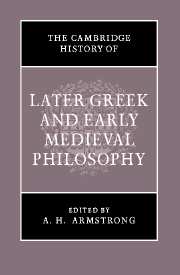Book contents
- Frontmatter
- Chapter 1 Introductory
- Part 1 GREEK PHILOSOPHY FROM PLATO TO PLOTINUS
- Part II PHILO AND THE BEGINNINGS OF CHRISTIAN THOUGHT
- Part III PLOTINUS
- Part IV THE LATER NEOPLATONISTS
- Part V MARIUS VICTORINUS AND AUGUSTINE
- Chapter 20 Marius Victorinus
- Chapter 21 Augustine. Biographical introduction: Christianity and philosophy
- Chapter 22 Augustine. Man: body and soul
- Chapter 23 Augustine. Reason and illumination
- Chapter 24 Augustine. Sense and imagination
- Chapter 25 Augustine. Human action: will and virtue
- Chapter 26 Augustine. God and nature
- Chapter 27 Augustine. Man in history and society
- Part VI THE GREEK CHRISTIAN PLATONIST TRADITION FROM THE CAPPADOCIANS TO MAXIMUS AND ERIUGENA
- Part VII WESTERN CHRISTIAN THOUGHT FROM BOETHIUS TO ANSELM
- Part VIII EARLY ISLAMIC PHILOSOPHY
- Select Bibliography
- Additional Notes and Bibliography
- Index of ancient and medieval works referred to in the text
- General Index
- Index of Greek terms
- References
Chapter 20 - Marius Victorinus
from Part V - MARIUS VICTORINUS AND AUGUSTINE
Published online by Cambridge University Press: 28 March 2008
- Frontmatter
- Chapter 1 Introductory
- Part 1 GREEK PHILOSOPHY FROM PLATO TO PLOTINUS
- Part II PHILO AND THE BEGINNINGS OF CHRISTIAN THOUGHT
- Part III PLOTINUS
- Part IV THE LATER NEOPLATONISTS
- Part V MARIUS VICTORINUS AND AUGUSTINE
- Chapter 20 Marius Victorinus
- Chapter 21 Augustine. Biographical introduction: Christianity and philosophy
- Chapter 22 Augustine. Man: body and soul
- Chapter 23 Augustine. Reason and illumination
- Chapter 24 Augustine. Sense and imagination
- Chapter 25 Augustine. Human action: will and virtue
- Chapter 26 Augustine. God and nature
- Chapter 27 Augustine. Man in history and society
- Part VI THE GREEK CHRISTIAN PLATONIST TRADITION FROM THE CAPPADOCIANS TO MAXIMUS AND ERIUGENA
- Part VII WESTERN CHRISTIAN THOUGHT FROM BOETHIUS TO ANSELM
- Part VIII EARLY ISLAMIC PHILOSOPHY
- Select Bibliography
- Additional Notes and Bibliography
- Index of ancient and medieval works referred to in the text
- General Index
- Index of Greek terms
- References
Summary
Life and writings
What is known of Marius Victorinus' life is contained in the short notice given by St Jerome in his De viris illustribus and in the better known remarks made by St Augustine in the course of the narrative of his own conversion. African by birth and a rhetorician by profession, he taught in Rome under the Emperor Constantius. His fame as a rhetorician is attested not only by Augustine, but also by the statue which was erected to him in the Forum of Trajan in his lifetime, probably in the early fifties of the fourth century. An inscription of the late fourth century shows that it survived in Rome for at least two generations. He had written grammatical, rhetorical and logical treatises, commentaries on Cicero and Aristotle. He had also translated ‘books of the Platonists’, as Augustine called them, and some of Aristotle's logical treatises and, very probably, Porphyry's Isagoge ‘In extreme old age’, as Jerome tells us, he became a Christian. This must have been soon after the erection of his statue in Rome, in the early or mid fifties, at any rate before 357 or 358, when the flow of his Christian theological writings begins.
Victorinus was closely associated with the senatorial aristocracy which became the last stronghold of Roman paganism. Augustine's celebrated narrative of Victorinus' conversion to Christianity allows us to glimpse something of the force of the social and cultural links which had held the distinguished rhetorician allied to the traditions of his class. To break them required the strength of mind which Augustine's story stresses and which served Augustine as a model for his own conversion. Augustine had already read Victorinus' translations of Neoplatonic literature when his Milanese friend, Simplicianus, who had known Victorinus well, told him the story of his conversion.
- Type
- Chapter
- Information
- Publisher: Cambridge University PressPrint publication year: 1967



